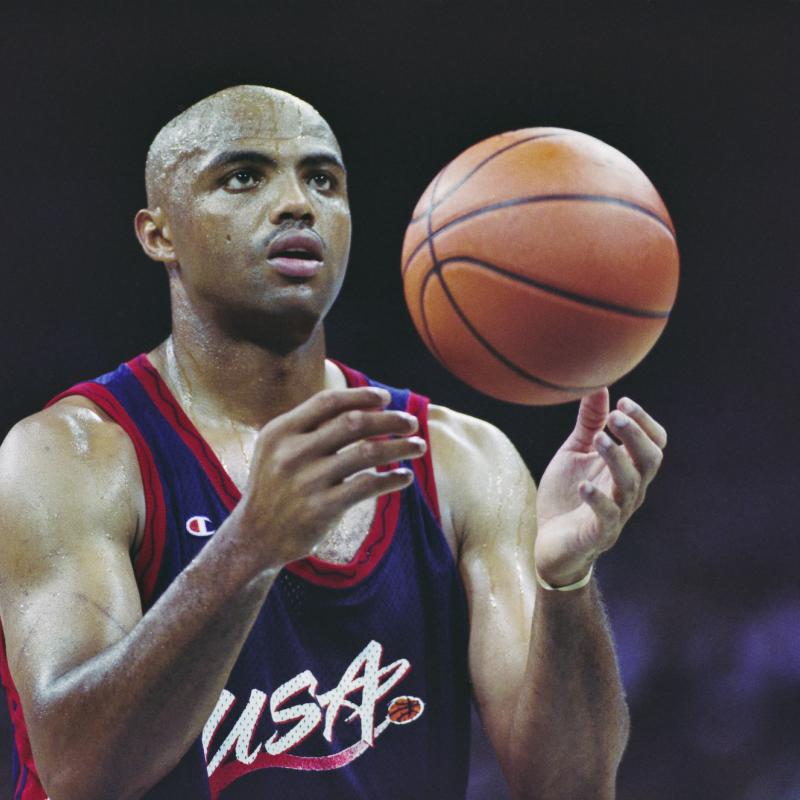Basketball Hall of Famer and former Boston Celtic Bill Russell
Basketball Hall of Famer and former Boston Celtic Bill Russell is considered the greatest defensive center in the history of the game. In the 1960s he helped the Celtic on to 11 NBA championships in 13 seasons. He was named the NBA's most valuable player five times. His book, Russell Rules: 11 Lessons on Leadership From the Twentieth Century's Greatest Winner, is now out in paperback. This interview first aired May 9, 2001.
Other segments from the episode on May 27, 2002
Transcript
DATE May 27, 2002 ACCOUNT NUMBER N/A
TIME 12:00 Noon-1:00 PM AUDIENCE N/A
NETWORK NPR
PROGRAM Fresh Air
Filler: By policy of WHYY, this information is restricted and has
been omitted from this transcript
* * * * * * * * * * * * * * * * * * * * * * * * * * * * * * * * * * *
Profile: Independent record label Stiff
TERRY GROSS, host:
The punk era was ushered in by bored teen-agers on independent labels. This
is pretty well-known. But what may not be remembered as well is that the
first of those independent labels started in Britain with a couple of bored
non-teens with a wacky sense of humor that caused them to name their label
Stiff. Rock historian Ed Ward has the story of a brief, glorious era of
wackiness.
(Soundbite of song)
Mr. NICK LOWE: (Singing) Oh, yes, I love my label and my label loves me. Oh,
she's so good and kind. Together we will live our destiny. My label always
loves to hear some pretty chords on its records like these ones. She's always
pleased to hear some of these pretty melodies, so I sing some.
ED WARD reporting:
Nick Lowe had good reason to love his label. After all, he'd been
instrumental in starting it, and he'd done a lot of work for it since its
inception. The label in question, of course, was Stiff, one of the looniest
commercial ventures of all time. Stiff was born in 1976 at the hands of Jake
Riviera and Dave Robinson, both of whom had started in the music biz as
roadies and worked their way up into becoming managers and presences on
England's pub rock scene. Like a small but vocal minority at the time, they
thought music was boring, at least what was getting recorded, and they decided
to do something about it and approached Nick Lowe, bassist with the recently
disbanded Brinsley Schwarz Band, for some of his publishing demos, two of
which got pressed up as the first Stiff single.
(Soundbite of "Heart of the City")
Mr. LOWE: (Singing) Well, in the heart of the city where the alligator roam,
I'm a little lost lamb, ain't got no place to go. Now I ain't got one minute,
just gotta sit on my back. I left home in a hurry, and I ain't never going
back. I'm looking for a home in the heart of the city.
WARD: "Heart of the City," and “So it Goes,” were so different from what was out
there that the record got immediate press, if no airplay. This was good.
Neither Robinson nor Riviera was averse to publicity, and they made sure each
new Stiff record stood out. Each had a picture sleeve, many had weird
messages scratched in the out groove and you never knew what to expect when
you touched the needle to the plastic. And that's how history gets made.
(Soundbite of "New Rose")
THE DAMNED: Is she really going out with him?
(Soundbite of guitar)
THE DAMNED: Ah!
(Soundbite of guitar)
THE DAMNED: (Signing) I got a feeling inside of me. It's kind of strange,
like a stormy sea. I don't know why, I don't know why. I guess these things
have gotta be. I've got a new rose, I've got it good. Guess I knew that I
always would. I can't stop to mess around. I got a brand-new rose in town.
WARD: People may quibble, but most agree that The Damned's "New Rose" was the
first British punk single. Produced by Nick Lowe, it enjoyed a modest chart
success and attracted more attention, causing New Yorker Richard Hell to offer
Stiff rights to his "Blank Generation" EP, the first trans-Atlantic punk
record.
But for all that, the Stiff aesthetic was more traditional, and their next big
artist was actually one of the younger pub rockers.
(Soundbite of "Less Than Zero")
Mr. ELVIS COSTELLO: (Singing) Calling Mr. Oswald with the swastika tattoo,
there is a vacancy waiting in the English voodoo, carving V for `vandal' on
the guilty boy's head. When he's had enough of that, maybe you'll take him to
bed to teach him he's alive, for he wishes he was dead. Turn up the TV; no
one listening will suspect. Even your mother won't detect it, so your father
won't know. They think that I got no respect, but everything means less than
zero. Hey! W--hey!
WARD: Elvis Costello established Stiff internationally, particularly after
he signed with Columbia in the United States. At last the label was making a
little money, and the artist roster was getting more interesting every day.
(Soundbite of "Sex and Drugs and Rock 'n' Roll")
Mr. IAN DURY: (Singing) Sex and drugs and rock 'n' roll is all my brain and
body need. Sex and drugs and rock 'n' roll are very good indeed. Keep your
city ways...
WARD: Ian Dury was an older chap with crutches due to childhood polio, an art
instructor whose band The Blockheads seemed to be mostly jazzers. "Sex and
Drugs and Rock 'n' Roll" may be his best-remembered song, but his beautiful
Cockney-accented vignettes of London life, like "My Old Man," were exquisitely
crafted.
By 1978, punk was part of the landscape, and New Wave was the new catchword.
Stiff, predictably, was on top of it, producing a record which may sound like
a parody today, but which was perfectly serious at the time.
(Soundbite of song)
Unidentified Woman: (Singing) Yeah, yeah, yeah, yeah, yeah, yeah, yeah. I
never used to cry 'cause I was all alone. Me, myself and I is all I've ever
known. I never felt the need to have a hand to hold, and everything I took, I
took complete control. That's where I come from. My lucky number's one.
Have everything I need to keep me satisfied. There's nothing you can do to
make me change my mind. I'm having so much fun. My lucky number's one. Oh,
ooh, oh, ooh.
WARD: In 1979, Stiff was on top of the world, despite Jake Riviera's
defection with his new management clients Elvis Costello and Nick Lowe, and
they decided it was time to announce the next big thing: the Akron sound.
Akron had, it's true, brought the world Devo, but neither the painful Jane
ayre nor teen-age Rachel Sweet had much staying power. Actually, the act
which saved Stiff's bacon was right in their back yard.
(Soundbite of song)
Unidentified Man: Hey, you, don't watch that, watch this. This is the heavy,
heavy monster sound, the nutsiest sound around. So if you're coming off the
streets and you're beginning to feel the heat, well, listen, buster, you
better start to move your feet to the rockingest rock-steady beat of Madness,
one step beyond.
(Soundbite of music)
Unidentified Man: One step beyond.
WARD: Madness was immense, gigantic and the most commercially successful of
all the neo-ska bands which ushered in the '80s. Although they continued to
be signed to Stiff until 1984, the label had clearly seen its day by 1981.
There was occasional inspired records, but too many stupid novelties. Stiff
died in 1986, although it was revived by outsiders for a while. But it left
behind memories of the days when it really lived up to its motto: `If it's
not stiff, it's not worth a...'
(Soundbite of horn)
GROSS: Ed Ward lives in Berlin.
(Credits)
GROSS: I'm Terry Gross.
(Soundbite of music)
Unidentified Group: (Singing) I remember when Mack the kid cut off his right
arm in a bid to save a bit of power. He got 50,000 watts and a big acoustic
tower. Security's so tight tonight, oh, they're ready for a tussle. Gotta
keep your backstage passes, 'cause the promoter has the muscle. And so it
goes, and so it goes, and so it goes, and so it goes.
Transcripts are created on a rush deadline, and accuracy and availability may vary. This text may not be in its final form and may be updated or revised in the future. Please be aware that the authoritative record of Fresh Air interviews and reviews are the audio recordings of each segment.


